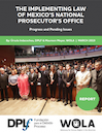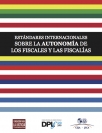Mexico is experiencing one of the most acute human rights crises of its history. Major corruption scandals, mass and systematic human rights violations, torture, murder, and spying against journalists and members of civil society are just some of the serious crimes that are being committed daily and that Mexico's Office of the Attorney General has been incapable of properly prosecuting.
Civil society organizations made the decision to help find a solution. The group #FiscalíaQueSirva has brought together more than 100 human rights organizations, victims' associations, academics, journalists, and business leaders united in the goal of achieving real transformation through the design of a new Office of the Prosecutor General that is truly autonomous, robust, and able to meet current challenges. DPLF has supported this initiative since its inception, contributing from the international and comparative law perspective.
On Tuesday, August 29, the groups #FiscalíaQueSirva and #VamosPorMás, joined under the slogan #VamosPorUnaFiscalíaQueSirva, publicly announced the presentation of a citizens' initiative to transform the current model of the Office of the Prosecutor General, safeguarding its autonomy. The main suggestions for reform contained in this citizens' proposal may be consulted here.
Principal milestones in this process:
On February 10, 2014, the Mexican Constitution was amended to create a new Office of the Prosecutor General (Fiscalía General de la República) with autonomy from the Executive Branch, to replace the current Office of the Attorney General (Procuraduría General) that is currently part of that branch of government.
- This constitutional reform introduced the so-called "automatic transfer," allowing the last Attorney General to automatically serve as the first Prosecutor General for nine years, without having gone through any selection process.
- In December 2016, despite reiterated public demands for an open and transparent appointment (see here and here) , the President named an individual from his inner political and personal circle as the new Prosecutor General, giving rise to the criticism that this was a possible attempt to "shield" the new institution in order to guarantee impunity. The Senate confirmed this appointment without question.
- Following these events, and given their impact on the country's human rights situation, the Inter-American Commission on Human Rights (IAHCR) granted a public hearing in early 2017 to receive information about potential risks to the autonomy of the nascent institution.
- Since that time, #FiscalíaQueSirva has been working to identify a suitable profile for the Prosecutor General and the minimum guarantees that should be provided in his or her appointment, as well as all other aspects that should be addressed in order to establish a truly autonomous, independent, and effective Office of the Prosecutor General, within the framework of the applicable international standards and making use of lessons learned from comparative experiences
- The Mexican Congress is currently studying various initiatives to amend the constitution to eliminate the "automatic transfer." The member organizations of #VamosporunaFiscaliaQueSirva have insisted that said elimination is not enough, and that the constitution must be comprehensively reformed with respect to the rules for the new Office of the Prosecutor General.
Key documents for understanding the process
- Draft citizens' opinion for the reform of Article 102 of the Mexican Constitution, presented by the member organizations of #VamosporunaFiscalíaQueSirva
- Report on the "State of Independence and Autonomy of the Justice System in Mexico," presented to the IACHR in a public hearing held on March 17, 2017
- Report on the guidelines for the selection of authorities in the justice system "Lineamientos para la selección de altas autoridades del sistema de procuración de justicia: fiscal o procurador(a) general"
- Press release of November 29, 2016: Civil society organizations demand the comprehensive amendment of Article 102 of the constitution to guarantee an autonomous Office of the Prosecutor General
Relevant videos and articles
- PROCESO, La CNDH y el Alto Comisionado de la ONU piden un fiscal autónomo e independiente (September 6, 2017)HUFFINGTON POST, Por qué importa tanto para México que la fiscalía sirva como un "nuevo poder" (September 6, 2017)
- EL PAIS, La elección del Fiscal abre una crisis política en México (September 6, 2017) CENCOS, #FiscalíaQueSirva (September 1, 2017)CNN Español. #FiscalíaQueSirva: México necesita controles exhaustivos para política criminal (November 29 , 2016)
- Conferencia de prensa sobre #FiscalíaQueSirva en el Senado (November, 2016)
- ANIMAL POLITICO, Raúl Cervantes y el costo de la improvisación(November 3, 2016)









